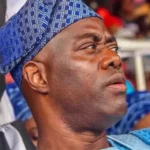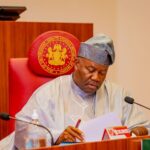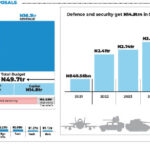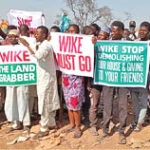Communication is key in this information age. Our new superstars are those ones on Instagram and Twitter, with millions of fans, whose every communication goes viral, shared to work the world into a frenzied state. It doesn’t matter if they are right, if they know what they are doing or even if they are compos mentis. Communication now constitutes 90 per cent to 95 per cent of leadership.
What else is there about leadership, if not communication? A leader is different from a mere manager because he/she is saddled critically with the art and science of visioning, and also taking the calculated risks that are outside the purview of a manager, whose role it is to ensure that all goes well in an organisation according to the laid down rules and regulations.
A leader must therefore learn to communicate, in words – written and spoken – as well as in cultivating the right body language.
In this social media age, the complexities of communication are ever so vivid. Nigeria is listed as the second most active country in terms of social media usage. There is a reason why GSM phones became a huge sellout in Nigeria and where we have one of the densest mobile telephony networks in the world today. We like to talk. Some of this stems from our cultures, which is mostly expressive and expansive.
Sudan crisis: Inside story of How Nigerian security community broke evacuation logjam
NDDC railway project will stimulate economic activities in Niger Delta – IYC
We like to greet ourselves and that is a core part of our cultures even though it is fast fading into some sort of Europeanisation. Someone may want to add that we also have a high unemployment and unemployability factor and what would the jobless do than to chat. By and large, we generate some of the heaviest big data traffic on social media for those large companies like Facebook and Twitter.
What I know is that we are fairly uncensored – compared to say the USA where the PATRIOT Act permits the government to listen to every conversation after the September 11, 2001 events – and we actually appreciated the advent of these social media communications more than in the countries where they were created.
But my concern today is how communication gets twisted, and lies become the truth in Nigeria, to the extent some Nigerians now perfectly understand that they could mount a campaign barrage, and repeat their concocted facts often enough until it becomes received wisdom.
There are two incidences that come to mind. The first is the best-forgotten EndSARS riots – a protest that was allowed to get out of hand and infiltrated by local and foreign terrorists as well as rogue, low-level regime change exponents.
EndSARS quickly became EndNigeria and EndBuhari. And the government either had no response at all or was too slow in moving until we saw the near destruction of Lagos. As policemen were killed in their dozens around the country the best we saw was embarrassing attempts by politicians to recruit their own area boys to counterbalance the terror unleashed by youths and their faceless financiers.
But the key point to draw out from that incident is the so-called Lekki ‘massacre’. Sundry elements have held on to their fable that the government unleashed soldiers on protesters at the Lekki Toll Gate and that they opened live fire on innocent youths, massacring dozens of them. Well, it depends on who you listen to, and when you listen to them.
A certain DJ Switch initially swore that she carried 15 corpses and handed back to the same soldiers who were shooting live ammunition at her. She later reduced the number to seven or eight. Notwithstanding that some boys among the protesters filmed themselves with guns at that same location, what seemed to be clear was that about two or three people presented in nearby hospitals with gunshot wounds and a couple may have died from what the hospitals called ‘blunt force’.
Now, my own knowledge is that blood is not water. If blood spills on the floor, the marks are almost impossible to rid of. How could a massacre have happened and the next day there were no bloodstains on the ground? Did anyone sight government workers – with the numbers of smartphones around – doing some sort of industrial cleaning of that location overnight? That shouldn’t be hard to do, right?
And so, government lost the plot, the battle, and the war and today, home and abroad, the story is that there was a Lekki Toll Gate massacre on October 20, 2020. In fact, a recent guber candidate swore as one of his manifesto points, to erect some sort of monument in the place, for worship by believers in the incident.
Till date, the government is unable to return the toll gates there, or to indeed anywhere in Lagos. Maybe it’s the guilt of having done wrong in one way or the other. But government in Nigeria has been losing ground, ceding more and more space to non-government actors – including increasingly belligerent youths and the not-so-young, who would rather heckle government into silence on every count, and who daily dream of an anarchical paradise where they hold sway.
All the frustrated people in Nigeria are in this camp and most of them are self-inflicted. Many who wasted their lives on drugs, destroyed relations, messed up at work, all of them blame Nigeria and distract governance today.
This article became highly urgent and imperative because another lethal broth is being cooked up and is almost getting set. It is this growing narrative that Yoruba killed Igbos in Lagos in the recently concluded elections.
It gets oft-repeated on social media and many top personalities including Chief Emmanuel Iwuanyanwu, in the presence of, with the approval of, and assistance from former President Olusegun Obasanjo, who chose the same event to speak about how Nigeria has been unfair to Igbos or something of that sort.
When Lagosians and Yoruba at large (for Lagos is officially and constitutionally in the southwest of Nigeria) complain about people saying Lagos is a no-Man’s-land and acting as such, they get called bigots by south easterners who understand how to protect their own territory from anyone’s incursion.
Scores of south-easterners (enterprising folks), are contesting for elections in the South West and everywhere in the name of a united Nigeria, but the leaders of the South East have not deemed it fit to even by affirmation begin to show that they are welcoming to the idea of having commissioners from outside their zones. The pain that comes with this skew is what Yoruba had to stand up for in the Lagos gubernatorial elections.
There was indeed voter intimidation which was captured severally with the use of our ubiquitous smartphones. But there was no killing of south-easterners willy-nilly. None was captured. None was even suggested. Where the narrative came from is what I cannot understand at all. I just urge we stop playing these deadly games with ourselves and allow the long-standing war to end.

 Join Daily Trust WhatsApp Community For Quick Access To News and Happenings Around You.
Join Daily Trust WhatsApp Community For Quick Access To News and Happenings Around You.


